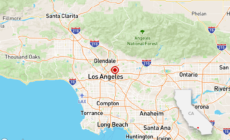-
California voters approve Proposition 4, environmental projects bond - 20 mins ago
-
Kamala Harris Was the Establishment in an Anti-Establishment Election - 30 mins ago
-
Travis Kelce Opens up on Final Eras Wish - 38 mins ago
-
Voters approve Prop. 3, reaffirming gay marriage in California - about 1 hour ago
-
2024 US Election: Donald Trump Won. But the Biggest Loser Was the Mainstream Media. - about 1 hour ago
-
Why Trump Won - about 1 hour ago
-
In close California House race, John Duarte battles for reelection against challenger Adam Gray - 2 hours ago
-
Russian Losses Approaching Three Grim Milestones - 2 hours ago
-
Typhoon Yinxing Makes Landfall in the Philippines - 2 hours ago
-
NATO Minister Issues Warning After Donald Trump Victory - 2 hours ago
Supreme Court to Hear Louisiana Congressional Map Case After Election
The U.S. Supreme Court is set to hear a case regarding the possible redistricting of Louisiana’s congressional map but not until after the upcoming election.
On Monday, the Supreme Court said it was deferring arguments on the case until early next year, meaning the 2024 elections will proceed under the disputed map. This development could work in favor of Democratic efforts to reclaim the narrowly divided House of Representatives.
Why the Map Is Contested
The map had previously been invalidated by a lower court, however the justices allowed it to be used in 2024 following an emergency appeal from civil rights groups and the state.
The central question facing the justices is whether the state excessively prioritized race when designing a second district with a Black voting majority.

AP Photo/Mariam Zuhaib/AP Photo/Mariam Zuhaib
The Congressional Districts Case
Monday’s order marks the latest chapter in a two-year federal court battle over Louisiana’s congressional districts. Over that period, lower courts have blocked two of the state’s proposed maps with the Supreme Court stepping in twice to weigh in on the matter.
In 2022, Louisiana’s Republican-controlled legislature redrew the state’s congressional map to reflect population changes from the 2020 Census. The revisions, however, largely preserved the existing balance: five majority-white districts favoring Republicans and one majority-Black district leaning Democratic, despite Black residents making up roughly one-third of the state’s population.
Citing Louisiana’s significant Black population, civil rights advocates brought the map to federal court in Baton Rouge, where U.S. District Judge Shelly Dick ruled in their favor, finding that the districts likely discriminated against Black voters.
The Supreme Court paused Judge Dick’s ruling as it reviewed a similar redistricting case from Alabama. This move permitted both Louisiana and Alabama to use their contested maps in the 2022 elections, despite federal judges finding that both maps likely discriminated against Black voters.
The Supreme Court ultimately upheld the Alabama ruling, prompting the creation of a new map with an additional district likely to elect a Black representative. The justices sent the Louisiana case back to federal court, signaling that revised maps should be ready for the 2024 elections.
The 5th U.S. Circuit Court of Appeals has set an early 2024 deadline for Louisiana lawmakers to produce a new congressional map, warning that failure to do so could result in the court implementing its own version.
Views on the Map
Republican Governor Jeff Landry, who previously defended Louisiana’s congressional map as attorney general, is now calling on lawmakers to adopt a new map that includes an additional majority-Black district. Landry supports a proposal to establish a district stretching across the state, connecting regions around Shreveport, Alexandria, Lafayette and Baton Rouge, and he plans to address the matter in a special session this January.
In a separate case, a group of plaintiffs identifying as non-African Americans filed a lawsuit in western Louisiana, arguing that the new map violated the Constitution by overly prioritizing race. A split panel of federal judges ruled 2-1 in April in favor of the plaintiffs, blocking the map’s implementation.
The Supreme Court has intervened before and previously paused the lower court’s ruling in a 6-3 vote, permitting the map to remain in use.
In an unusual split, the three liberal justices dissented, despite typically backing Black voters in redistricting cases. Justice Ketanji Brown Jackson, writing for the dissent, argued that there was sufficient time to draft a new map. She noted their objection to prior Supreme Court orders that cited upcoming elections as a reason to halt lower court decisions.
This article includes reporting from The Associated Press.
Source link




















